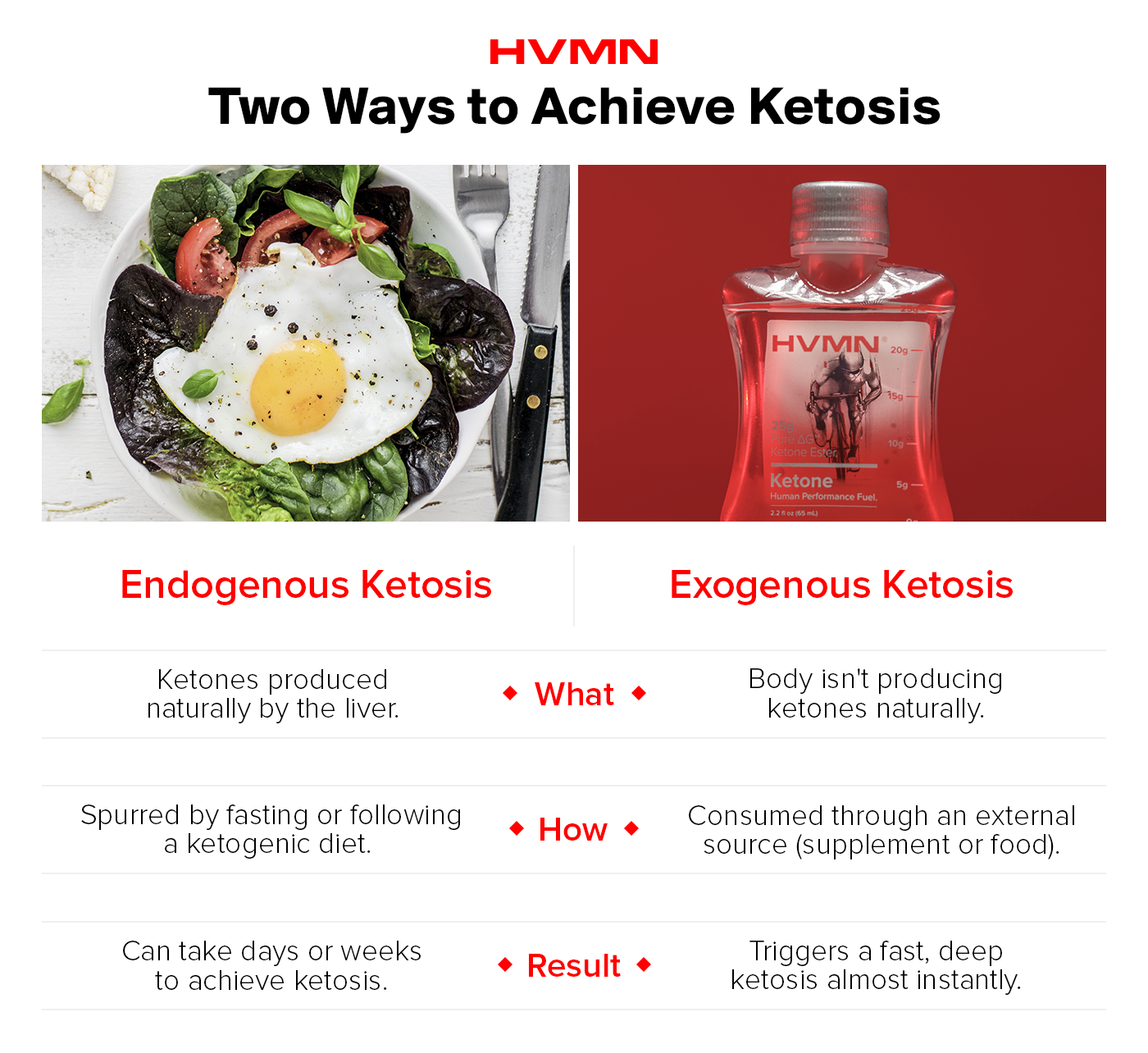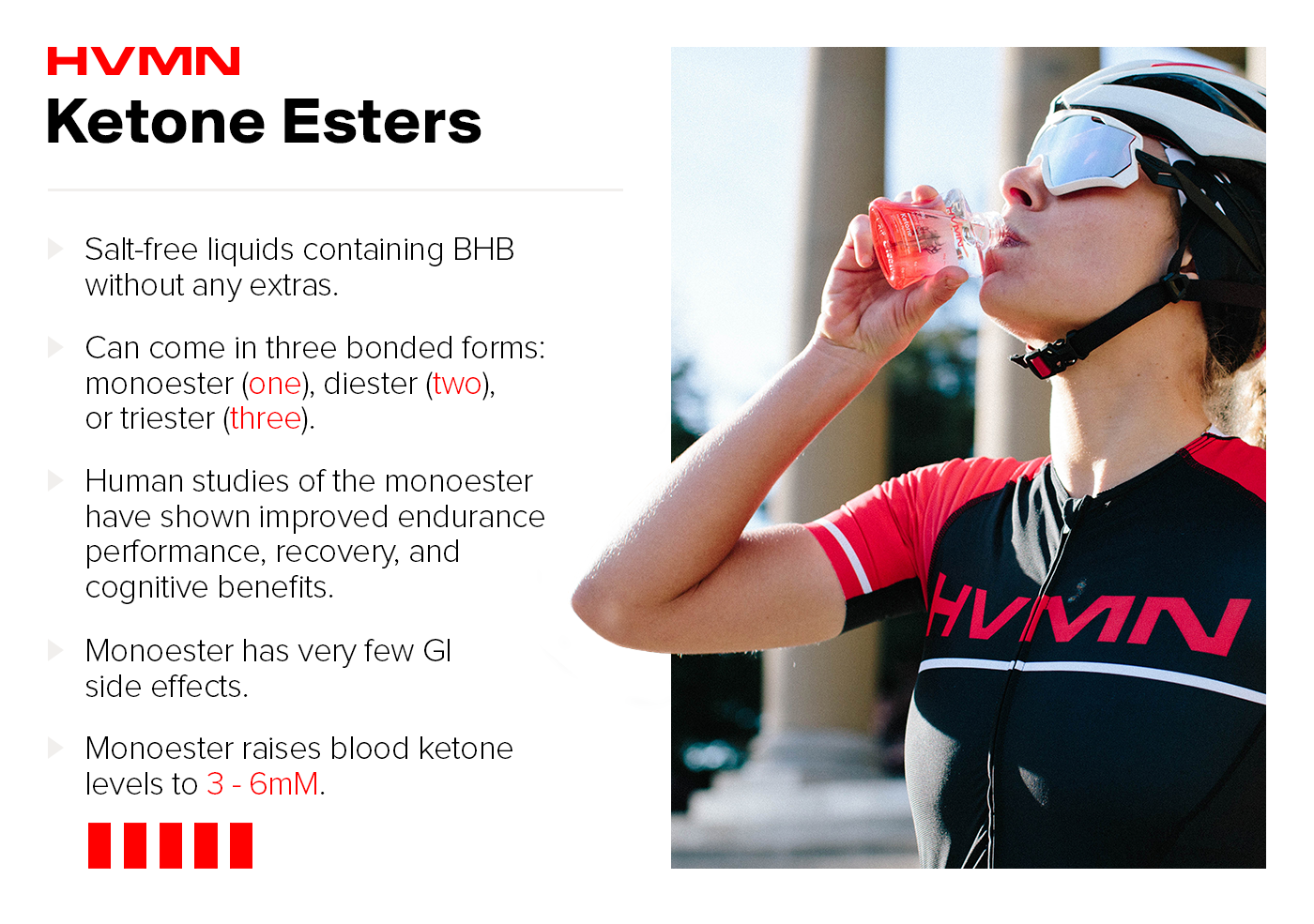With the increasing excitement and emerging scientific research surrounding keto, more and more people are trying out the high-fat, low-carb diet for body composition and exercise performance. Maybe you’re one of them!
While the health benefits are promising, you may have also found that maintaining a state of ketosis can be extremely difficult, especially with the Western diet’s love affair with carbohydrates.
If that's the case, you may want to consider optimizing your keto diet. Supplements could be a great tool that can help you get into a deep state of ketosis faster than dieting and/or fasting alone.
The most widely available keto supplements on the market are exogenous ketone salts, which are formed when ketones (energy-generating molecules derived from fatty acid breakdown) are bound to a mineral ion. Let’s assess some of the nuances around ketone salt supplements and other types of exogenous ketones to help you make the best decision for optimizing ketone levels.
Ketones 101
Before launching right into ketosis, it’s important to understand the science behind ketones themselves.
Ketones are a fundamentally different fuel source than the carbohydrates, fat, and protein that our bodies typically rely on for energy. A highly efficient energy source, the body produces ketones when pushed to its limits - either during extreme carb restriction
Achieving Ketosis
Ketosis is generally defined as elevated blood ketone levels greater than 0.5mM.

Endogenous ketones are produced by the liver, usually when someone is in a fasted state or on a ketogenic diet. The production of endogenous ketones can take weeks or months of strict dieting.
Taking exogenous ketones can deliver a fast-acting, deep state of ketosis almost immediately.
Exogenous ketones are often consumed as a dietary supplement or through food consumption. They can put you in a state of ketosis,

Different Types of Ketone Bodies
The three primary ketone bodies are beta-hydroxybutyrate (BHB), acetone, and acetoacetate (AcAc). Most exogenous ketones products utilize BHB rather than AcAc because BHB is more stable and easier to make into a sellable product. Acetone, on the other hand, is considered to be a waste product of fatty acid breakdown.
Acetoacetate is created in the liver from the breakdown of fatty acids and then mostly converted into BHB for transport in the blood. Any AcAc in the blood can be either taken up into the cells or spontaneously broken down to produce acetone—which cannot be used for energy production. Acetone is removed from the body through waste products like urine, or through the breath.
BHB is the ketone body present in the blood at the highest level when produced naturally.
Once taken up into the cells from the blood, BHB offers the advantage of being reduced easier than AcAc. This means that when BHB is converted into AcAc inside the cell’s mitochondria, it generates NADH—a coenzyme needed for ATP production. AcAc whiffs on the energy-providing power of NADH. Plus, when an AcAc-based supplement is consumed, the body will reverse-convert some of it to BHB, which actually uses up those NADH molecules.
Exogenous Ketones: Salts, MCT and Esters
We'll first explore ketone salts before analyzing some potentially more effective alternatives.
Ketone Salts

Ketone salts typically come as a powder containing BHB bound to a mineral salt (usually either sodium, potassium, or calcium) or amino acid (like lysine or arginine). These powdered BHB salts are commonly dissolved in liquid to be consumed in drink form.
Despite the lack of published work analyzing the effects on biomarkers or performance measures in humans, ketone salts are a growing market. It is important to note that the FDA doesn’t recognize ketone salts as GRAS (Generally Regarded as Safe) food ingredients.
Many studies have been conducted in rats
One recent study in young adults illustrated the differences between salts and esters (more on these later) acutely: ketone salts provided a peak D-BHB of 1 mM whereas the same amount of BHB in a ketone ester raised blood BHB levels to 2.8 mM.
For performance, data has been mixed at best. Four studies investigated the effects of ketone salts in athletes (total n = 22) with none of the studies finding significant improvements in performance markers.
While ketone salts are relatively inexpensive and may be a nice co-deliverer of other nutrients, BHB levels are only raised slightly–to 1 mM.
Excessive salt consumption may have long-term health implications.
High salt intake is linked to hypertension, cardiovascular disease and even stomach cancer.
A perceived benefit of ketone salt supplementation is a potential replacing of lost electrolytes. Electrolytes loss is a common problem in the early weeks of the keto diet. However, electrolyte imbalances usually don’t persist after keto-adaptation period of about 28 days,
Let’s review: ketone salts provide sub-optimal BHB, have no effect on performance and may cause significant GI issues. That could be why some makers of ketone salts have cited studies conducted on ketone esters.
So if not salts, then what other options do you have to increase ketones exogenously? Here are two, which have shown varying degrees of success.
MCT Oil
OK, you caught us. MCT oils don’t actually contain ketones. They’re medium-chain triglycerides (MCT) fat molecules made of glycerol joined to three medium-length fatty acid chains that are between 6–12 carbons in length.
So where do the ketones come from? Ketone generation results from the breakdown of MCTs by the body. They’re processed differently than long-chain fats, which are absorbed and released into the blood via the lymphatic system, bypassing the liver (where ketones are produced). Instead, MCTs are transported straight to the liver in the blood, where they’re either used directly for energy or turned into ketones.
MCTs exist naturally in some foods such as coconut oil and dairy products. But a high amount is required to increase blood BHB. Studies on MCT supplements report that blood ketone levels following MCT use were relatively low (0.5 - 1mM).
While MCTs aren’t exactly exogenous ketones, they do provide a substrate by which one could potentially increase blood ketone levels.
Ketone Esters
Ketone esters are salt-free liquids that contain BHB without any extras. Instead of being bound to a mineral, like BHB salts, they’re bound to a ketone precursor (like butanediol or glycerol) via an ester bond. You can tell how many ester bonds there are from the name: monoester (one), diester (two), or triester (three).

They aren’t exactly a new discovery either. The first ketone ester was developed in the late 70s, and other types were developed in the mid-90s.
There are a couple of types of ketone esters being developed and sold right now with each affecting the body differently. H.V.M.N.'s Ketone 1.0 was the world's first commercially available ketone ester, creating a new market for these products when it was first released in 2017.
An AcAc diester was developed at the University of South Florida. In rodents, it increased blood D-BHB to 1 - 4mM, and blood AcAC up to 5mM.
The D-BHB monoester raises blood ketones to exceptional well, roughly a 3 - 6 mM increase within 30 minutes of consumption.
And it’s salt free so it won’t impact water retention or pose any of the health risks often associated with high salt levels. Side effects of the ester itself are also minimal. A single does of D-BHB mixed with a meal replacement formula reported very little gastrointestinal issues at typical doses and only caused mild symptoms when taken at 4x the recommended amount.
Ketone esters have proved beneficial for endurance performance also.
And while list of benefits of BHB monoesters runs long, for now, taste is not on that list. We’ve heard it “tastes like it works,” which is a polite way of saying that the taste is distinct and strong. But for athletes, a single bitter sip is worth the performance benefits. Certain ketone esters have FDA GRAS (generally regarded as safe) status as a food, are cleared for use in athletes by the World Anti Doping Agency (WADA), and are batch tested as part of the NSF Safe for Sport program.
For performance and recovery, human studies on ketone esters have demonstrated extremely positive results.
When consumed before exercise, the D-BHB from helps muscle work 28% more efficiently than carbs alone. This means that the body does more work with the same amount of oxygen.
There’s also some exciting research emerging around the cognitive benefits of ketone bodies (because ketones can cross the blood-brain barrier). The D-BHB ketone ester has been shown to help mice solve maze puzzles 38% faster than normal
The Next Generation of Exogenous Ketones
There are a couple of types of ketone esters being developed and sold right now, with each affecting the body differently. H.V.M.N.'s Ketone 1.0 was the world's first commercially available ketone ester, creating a new market for these products when it was first released in 2017.
Now, there is a new form of exogenous ketone available to enhance performance, sharpen focus, and provide sustained, clean energy: H.V.M.N. Ketone 2.0. This concentrate offers the same benefits as ketone esters, but at a lower cost per serving and with optimized results.
The optimal range for blood BHB is typically between 1.0–2.5 mM. Ketone 2.0 can elevate blood BHB to these optimal levels for as long as 3-4 hours, compared to two hours while using Ketone 1.0. MCTs and ketone salts, on the other hand, are unable to reliably raise blood BHB to this range. Ketone 2.0 can also elevate blood BHB for over 6 hours in total, which can provide valuable benefits for endurance athletes and others who require varied, sustained sources of energy for metabolic flexibility.
Are Ketone Salts Right For You?
While deciding which exogenous ketone supplement is best for you depends on a number of factors, it ultimately lands on what goals you're looking to achieve.
Ketone salts are less expensive than ketone esters and do provide a mild boost in ketone levels. They have a milder taste that is easier to mask with artificial sweeteners, like stevia and other natural flavors. However, the science behind ketone salts is still lacking, with no clear evidence for weight loss, cognitive ability, or improved performance. In fact, in some cases, performance decreased due to overwhelmingly negative side effects.
While the taste of some ketone esters leaves something to be desired, the data pointing to increased performance in human studies makes it worthwhile to investigate as a potential ergogenic aid.
If you’re an athlete or dieter considering an exogenous BHB supplement for physical performance or nutritional support, evidence-based results are best for helping highlight how exogenous ketones might affect you. Ultimately, your choice of supplement should be based on your budget and personal needs.
Have you used BHB salts? Have you tried esters? Let us know your experience in the comments.
